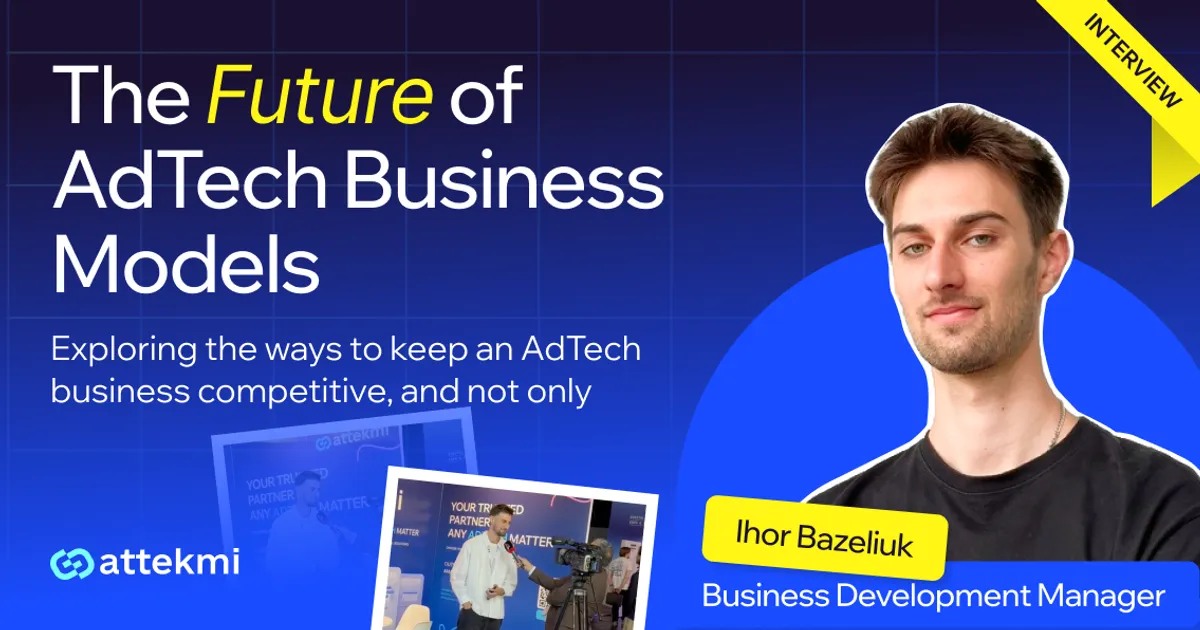Welcome to our interview series! Today, we are talking to Ihor Bazeliuk, our Business Development Manager. Ihor helps Attekmi grow and reach new heights, and he has some insights to share with you!
The AdTech industry never stands still, and not only in terms of technology. So, what is the future of AdTech business models? What to expect? Read on to discover.
Thanks for joining us! Before we start, tell us a bit more about your career path at Attekmi. It was pretty impressive, right? What helped you gain a position of a Business Development Manager?
Thanks! It’s been quite a journey indeed. I joined Attekmi about three years ago, starting in a research and lead generation role, where I focused on identifying potential partners and analyzing market trends. Over time, I became more involved in direct communication with clients, product discussions, and partner onboarding, which eventually gave me a deep understanding of both the technical and business sides of our platform.
I think what really helped me grow into the Business Development Manager role was curiosity and consistency. I’ve always wanted to understand not just who our clients are, but how the industry works, what role each player has, what our real value is, and why they should choose us – and, of course, how we can make their experience even better. That mindset, combined with a great team that truly supports growth and learning, made the transition feel very natural.
Okay, now let’s get back to the topic. So, nowadays, clients are seeking long-term relationships with AdTech providers, and, actually, AdTech providers do the same. Why? Do you think this trend will remain in force in the future?
Absolutely, this trend makes a lot of sense. Today, both clients and AdTech providers are seeking long-term partnerships – and I believe they always have, although choosing the right partner can be challenging. For our partners, it’s about stability, scalability, trust, and predictability – and this is exactly what we deliver. Working with a reliable partner means fewer technical surprises, smoother integrations, and a deeper understanding of their specific business needs over time. For AdTech providers, long-term relationships bring deep industry insights, recurring revenue, and the ability to create something innovative and impactful together.
As programmatic advertising and digital media grow more complex, AdTech companies will increasingly value partners who act as consultants and strategic allies, not just vendors. Providers who invest in understanding their clients’ workflows, challenges, and growth goals will be the ones who retain clients and thrive in the long term.
How can small AdTech companies compete with industry giants? Do you expect any new approaches to enter the stage?
In many cases, it’s not about replacing the giants, but about finding niches where you can deliver real value and build trust. Small AdTech companies are amazing, and they can definitely compete with industry giants – but it’s about playing smart, not big. The key advantages lie in agility, specialization, and client-centric innovation. Smaller players can experiment faster, implement new technologies more quickly, and provide tailored solutions that larger companies often struggle to deliver at scale.
Looking ahead, the AdTech landscape will continue to evolve, as there are still many challenges to solve. I expect new approaches to emerge around privacy-first programmatic solutions, transparency, and AI-driven optimization. Small companies that can identify inefficiencies in the market, leverage data creatively, and adapt quickly to regulatory or technological shifts will continue to carve out space, even in a landscape dominated by giants.
Okay, and what about emerging technologies like blockchain? Do you think they can somehow affect traditional AdTech business models?
In the AdTech industry, there have been a lot of talks about blockchain. However, I think we are steadily approaching the moment when it will start having a real impact.
The main benefit is that blockchain can help enhance transparency and prevent ad fraud. Technology adoption and scalability may introduce certain challenges, but I guess blockchain can push the industry toward greater openness and security. For instance, adopting blockchain could ensure verification of all the parties involved in the process, preventing fraudsters from tricking the system. Payments could also become more secure.
I don’t think that blockchain will fully replace traditional models. At least, not now and not in the near future. Instead, it can complement them and increase its impact gradually. I guess that is inevitable since the industry is striving for transparency and security, and this trend is not going to change.
Modern advertisers are increasingly switching to first-party data. What effect will it have on the AdTech platforms, and how can providers respond?
That’s a major shift we’re already seeing across the industry. As advertisers move toward first-party data, AdTech platforms need to adapt their technology and mindset. This trend is driven by privacy regulations, the deprecation of third-party cookies, and a general demand for more transparent, data-responsible advertising.
For AdTech providers, it’s both a challenge and an opportunity. On one hand, it limits access to broad-scale third-party audience data; but on the other hand, it creates huge opportunities to build deeper, more meaningful connections with partners who own strong first-party datasets. Platforms that can seamlessly onboard, enrich, and activate first-party data while maintaining strict privacy compliance will become incredibly valuable in this new ecosystem.
In response, providers should focus on data collaboration frameworks, clean rooms, and privacy-first identity solutions. Those who can help advertisers make the most of their first-party data, while ensuring full transparency and security, will be the ones who truly stand out in the next phase of programmatic evolution.
In your opinion, will open-source AdTech solutions gain a significant competitive advantage in the future?
Open-source AdTech solutions definitely have potential, and we can already see that with Prebid – probably the best example of how open-source can reshape the industry. Prebid brought transparency and standardization to header bidding and proved that community-driven technology can successfully compete with proprietary systems.
The main advantage of open-source tools like Prebid is control, flexibility, and transparency – companies can customize the technology, build on top of it, and adapt it to their specific needs without being locked into a single vendor’s ecosystem. That’s very attractive, especially for smaller players or those who want to innovate fast.
Still, open-source comes with its own challenges, like the need for technical expertise, maintenance, and scalability. That’s why many companies prefer a hybrid model, combining open-source transparency with the reliability and support of commercial solutions.
So, while open-source projects like Prebid will continue to gain influence, I believe the future lies in a balance between openness and managed infrastructure, where companies get both freedom and stability.
What type of AdTech companies do you expect to dominate the market in, let’s say, five years? Will this be technology platforms, data providers, or anything else?
Honestly, I think the winners in five years will be those who manage to combine technology, data, and strategy into one ecosystem. It won’t just be about pure tech platforms or data providers anymore – it’ll be about who can offer real value through integration, transparency, and intelligence.
Technology platforms that stay flexible, privacy-compliant, and data-driven will continue to lead, but I also expect to see a rise in specialized players – companies that focus on contextual targeting, supply-path optimization, clean rooms, and cross-channel measurement.
In short, the dominant AdTech companies of the future will be the ones that can simplify complexity for their clients – providing not just tools, but clear insights, automation, and strategic partnerships.
Thanks! And the last question. Nowadays, AI is impacting virtually every business aspect. In your opinion, will it reshape the role of human expertise in AdTech business development?
I don’t think it will replace human expertise; rather, it will reshape and amplify it.
AI can analyze data faster, optimize campaigns in real time, and even predict performance patterns – but it still can’t build relationships, understand context, or make strategic decisions the way people can. In business development, those human elements – empathy, trust, and understanding client goals – remain essential.
What I do see happening is a shift: AI will take over many routine, data-heavy tasks, allowing professionals to focus more on strategy, creativity, and partnership building. So instead of replacing humans, AI will empower them to work smarter and make decisions with much deeper insights.
At Attekmi, every team member is an experienced professional with a keen eye for innovation. Follow our interview series to gain more insights from our experts!
Searching for an effective and profitable ad exchange solution? Contact us to discover how we can help your business grow.
 By Iryna Kozirevych
By Iryna Kozirevych